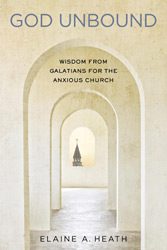On this 75th anniversary of the beloved tale The Hobbit, by J.R.R. Tolkien, we’re delighted to be featuring a new book in our Book Club by internationally regarded Tolkien scholar Devin Brown, The Christian World of The Hobbit. Brown’s book is the first in-depth look at Tolkien’s timeless fantasy story and its deep roots stemming from his faith.
We asked Brown, an English Professor at Asbury University in Kentucky and author of numerous books on Tolkien and C.S. Lewis, to share some of his insights into the Christian world of The Hobbit, and why he remains so fascinated with all things Middle-earth.
A lot of books have been written over the years about The Hobbit and The Lord of the Rings. Why did you want to write yet another, and what makes your book unique?
Up until now there have not been many book-length treatments of The Hobbit. Most of the attention, as you might expect, has been on The Lord of the Rings. Of the few books which explore The Hobbit, mine is the first to look at the faith elements we find there. In that sense you could say The Christian World of The Hobbit is somewhat ground breaking.
 You contend that while Tolkien’s Christian faith infused his story, The Hobbit is not allegorical. That might surprise some folks.
You contend that while Tolkien’s Christian faith infused his story, The Hobbit is not allegorical. That might surprise some folks.
Part of the problem is just vocabulary. Most people have only a vague idea of what an allegory is. In an allegory, the surface story is not very interesting. It is only there to point to the secondary meaning below the surface. If you think about The Parable of the Sower, you have perfect illustrations of what an allegory is. We could say that everything in the literal story—the seed, the rocky ground, the weeds—they all stand for something else. The Hobbit is not like this. Gandalf does not equal Christ, Gollum does not equal Judas, Smaug does not equal Satan, and the ring does not stand for original sin. There are Christian parallels all throughout the book, but that is something quite different from an allegory.
What, then, makes this book decidedly Christian?
Perhaps one way to answer this question is to look at a story that is decidedly un-Christian, like one of the novels by the French existentialists. These writers—figures such as Sartre and Camus who were writing at the same time as Tolkien—show us a world where there is no meaning, no purpose other than what we decide to give it, no right or wrong, and no God. In these works the protagonists find themselves alone in a vast, meaningless universe.
In Tolkien’s fiction, just the opposite is true. Bilbo lives in a world full of purpose and meaning where he is connected to others as well as to something beyond Middle-earth. In Gandalf’s final line, he says to Bilbo: “You don’t suppose, do you, that all your adventures and escapes were managed by mere luck, just for your sole benefit?” In the end Bilbo comes to see that what we would call Providence has been at work in his life, not luck.
You talk about the almost “stealth” way Tolkien weaves a Christian worldview into his story. Why wasn’t he more obvious with his religious references?
One of the best ways to approach that question can be found in a letter C. S. Lewis wrote on August 14, 1954—right after The Lord of the Rings had come out. Lewis seems to have had the contrast between his writing and Tolkien’s in mind, as he tells a correspondent:
“I think you have a mistaken idea of a Christian writer’s duty. We must use the talent we have, not the talents we haven’t. We must not of course write anything that will flatter lust, pride, or ambition. But we needn’t all write patently moral or theological work. Indeed, work whose Christianity is latent may do quite as much good and may reach some whom the more obvious religious work would scare away.”
Work whose Christianity is latent may do quite as much good and may reach some whom the more obvious religious work would scare away. I am sure many Tolkien fans would agree.
Your book is divided into three sections that capture the core spirituality of The Hobbit. Can you briefly describe these and how they play out in the story?
I first look at the Providence in The Hobbit. Many Christians can relate to this aspect where what may seem to be just mere chance or coincidence at the time, in looking back is seen to be something far greater.
Then I look at the purpose. Gandalf promises Bilbo that the adventure will be “very good for you—and profitable too.” Bilbo returns home with a very different kind of treasure than the one the company sent out to regain. He returns with the kind of treasure that thieves cannot steal and that will never rust.
Finally, I look at the moral landscape of The Hobbit. There I cover a number of topics including: the fact that there is always a right and a wrong action; the power of gold; and the theme of “not by power, nor by might.”
What are some of the spiritual lessons that run through The Hobbit?
There are a number of lessons we could point to. Blessed are the meek. The love of money is the root of all evil. You must lose your life to find it.
One of my favorites is that it is in giving that we receive. Each of these truths can be found in The Hobbit.
Does someone need to be Christian to enjoy Tolkien’s works?
Definitely not. Millions of people from all over the world, of all ages, from every background, have enjoyed Tolkien’s stories over the past seven decades. You do not need to be a Christian to enjoy them, but if you want to fully understand them, then you need to understand the faith that Tolkien’s fiction was founded on. I would say that this greater understanding leads to greater enjoyment.
What was your first introduction to The Hobbit?
Today when everyone has heard of Tolkien and hobbits and The Lord of the Rings, it is hard to imagine that before the films came out, noy everyone knew about Middle-earth. I grew up in a working class neighborhood on the Southside of Chicago where books and authors were not a major part of most people’s lives.
One summer when I was in middle school, my family went on a camping trip—something I was not crazy about. I checked out the four biggest books I could find from the library so I would have something to do. I discovered Tolkien on my own while sitting at a picnic table at a State Park in Indiana. For the first 30 pages or so, I actually thought that Hobbits were real.
With the premiere of The Hobbit movie just weeks away, how do you think Hollywood will treat the religious themes in the book?
That’s the nice thing about Tolkien’s latent Christianity. Because the faith elements are not on the surface, I doubt that the secular filmmakers care very much about them. Tolkien’s faith was infused into The Hobbit. All the filmmakers need do is be faithful to the book for them to be present.
You teach a class on J.R.R. Tolkien and C.S. Lewis, have written numerous books about these authors, and speak at Lewis and Tolkien conferences all over the world. What is your fascination with the works of these two authors?
In some ways I am not sure you can ever fully explain why you like a favorite author more than others. I could point to the deep spiritual truths that are such a major part of Lewis’s and Tolkien’s fiction. I could also point to what I consider to be great writing–great plots, great characters, and great descriptions. I suppose the best answer is that I can read and reread their works and always find something new in them and always be moved by them.
What is your favorite Tolkien book?
I end up rereading The Fellowship of the Ring about every three or four years. I like it because the hobbits are on their own for so much of the story. Once they get to Rivendell, they enter a world very different from our own, but up until then, their struggles are still small enough that we can go through them along with them.
On this 75th anniversary of The Hobbit, why do you think this story is as popular, if not more so, now than ever?
Tolkien’s stories are not just popular, they are cherished and beloved by millions of readers. They are the kind of story that give greater meaning to those who read them. I would say that one reason they are so widely popular today is because they are so deeply needed by people.
Finally, what do you most hope people take away from your book?
I hope that people come to understand how Tolkien’s faith impacted his fiction and that this understanding makes their reading more meaningful and more enjoyable.
Visit the Patheos Book Club for more – including a book excerpt – on The Christian World of The Hobbit!












